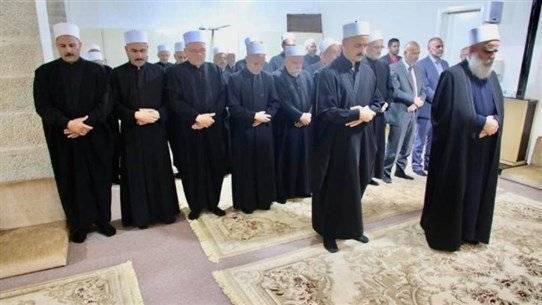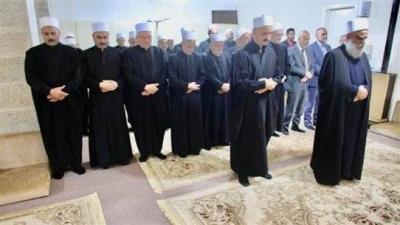Sheikh Sami Abi al-Muna, the religious leader of the Druze community, led prayers for the Eid al-Adha at the shrine of the late Sheikh Abu Hussein Shibli Abi al-Muna in the town of Shaniyeh, with participation from a group of religious figures, community leaders, and members of the Druze religious council.
After the prayer, Abi al-Muna delivered the Eid sermon, stating: "God Almighty says in His glorious book: 'To Allah belongs the east and the west; wherever you turn, there is the face of Allah. Indeed, Allah is All-Encompassing and All-Knowing.' (Al-Baqarah, 115) And He says: 'Righteousness is not that you turn your faces toward the east or the west, but [true] righteousness is in one who believes in Allah and the Last Day and the Angels and the Book and the Prophets, and gives his money, in spite of love for it, to relatives, orphans, the needy, the traveler, those who ask [for help], and for freeing slaves; and establishes prayer and gives zakah; and those who fulfill their promise when they promise; and those who are patient in poverty and hardship and during battle. It is those who have been true, and it is those who are the righteous.' (Al-Baqarah, 177) From this faith-driven perspective and this divinely revealed social message, we extend heartfelt congratulations and prayers to you on this blessed Eid, as we celebrate the 10th of Dhu al-Hijjah, with successful pilgrimage calls and hopes for goodness, through the sincerity of heart and purity of conscience."
He added: "As we ask Allah during these blessed days to help us comply with the command of truth and to humbly submit to the good morals imposed upon ourselves and our community, we pray for our resolve to purify our souls and hearts, to guide our minds, and to unite around the all-encompassing unifying word, gathering us for the good. This question emphasizes our obligations and responsibilities, which necessitates acting with pure intentions and diligent will, with wise leadership so that we deserve acceptance with Him; and deserving acceptance requires us to continually and vigilantly strive to refine our actions and reform our deeds according to the clear objectives of the verses and to purify our hearts from all that contravenes the truth and obstructs our journey on His ranks. In that, the purpose of the religious obligation is fulfilled, and the ultimate goal of pilgrimage is achieved. The believer, in front of the mirror of truth, can only heed the command of Allah with humility, meekness, and self-abasement, which reflects on his behaviors, starting with his dealings with himself, his family, and his immediate community. Thus, the blessed nights and days become a space for goodness, a pathway for elevation, and a stop for reform, making the holiday exist in its spiritual sense, not only in its temporal appearance."
He continued: "The true sacrifice that Allah accepts is the sacrifice of personal interests for the good of the community, the offering of what one's desires seek in service of the public interest, moving from an individual perspective to a broader vision, from a narrow space to the vastness of truth, and reaching the noble human escalation to high levels of behavior by calling for good, commanding what is right and forbidding what is wrong, striving tirelessly inspired by conscience and faith, replacing hostility with love, alienation with camaraderie, and malicious words with engagement in productive and beneficial work so that our conscience remains clear before the One, and our inner being remains in peace and reassurance, as we respond to His words: 'And let there be [arising] from you a nation inviting to all that is good, enjoining what is right and forbidding what is wrong. And those will be the successful.' (Ali Imran, 104)"
He stated: "The unification of efforts towards public service and working towards achieving accomplishments that benefit people necessitates sincere commitment and a sense of responsibility to preserve the essence of noble teachings. Our conviction is that what hinders the will for good is clinging to preconceived ideas, narrow interests, the embrace of selfishness, and a lack of concern for the reality of fragmentation and submission to the status quo, which prepares the ground for division and estrangement. What is more challenging than alienation among family and brothers, and what is more heartbreaking than the alienation among them — this is what our conscience rejects and our feelings abhor, as it contradicts the principles and essential traits that form the roots of our Islamic, unifying, and esteemed national heritage."
He added: "With the arrival of this blessed holiday, and as pilgrims to the House of God raise their supplications and prayers today on Mount Arafat, we hope that politicians and officials will respond with the same purpose and sacrifice, each from their position, striving tirelessly and continuously, casting away the stones of hatred and slaughtering malice, addressing conflicts and grievances, and silencing the rhetoric of escalation and rivalry that the Lebanese have grown weary of, while earnestly searching for effective means to address the life issues of people, which are of utmost priority. To achieve this hoped-for aspiration and the goal of this blessed Eid, we encourage the offering of desired sacrifices and invite everyone to sacrifice for our own goodness and the welfare of the homeland: let us sacrifice our desires and cravings, uplifting our intentions, words, and actions to something higher and nobler to achieve our humanity and fulfill the purpose of our existence. Let us offer sacrifices to rid ourselves of selfishness and individual disputes for the establishment of a community of virtue, goodness, mercy, and righteousness. Let us make sacrifices for Lebanon and its broken people, for the salvation of the homeland and the rescue of whatever remains of hope for the Lebanese. Let officials sacrifice their desires and sectarian projects for the long-awaited state project. Let presidents, ministers, and every seat-holder in this state sacrifice some of what they desire and contend over to secure the health, education, housing, and living needs for those who have reached the brink of collapse, while some leaders remain indifferent. Let all of us sacrifice anything that harms Lebanon's good relations with our Arab brothers and with friendly nations around the world, for that is the way to reach the Eid and rescue Lebanon."
He continued: "The responsibility for the economic decline and the overall collapse lies with those in power who brought the country to its current state, and with those who still obstruct the process of reform and simplify state matters, imposing impossible conditions for the formation of the government, those who sleep soundly while social tragedies multiply and living crises worsen, and the crisis of depositors exacerbates as they are forced to withdraw their money at a low price against their will, in a blatant theft of their funds, while state institutions are weakening and closing their doors and services to seekers, unable to face crises and solve citizens' problems, which poses a danger to the future of the state and people's trust in the homeland."
He asked: "Shouldn't responsible leaders devise solutions and exits for these crises to alleviate the pain and hardship endured by the Lebanese, facing economic, living, social, health, and educational tragedies? Shouldn't they adhere to the spirit of the constitution and solidarity to face internal and external challenges? Lebanon, with its heritage, diversity, freedom, coexistence, unity, history, civilization, Arab identity, and openness, deserves loyalty and sacrifice to save it from an existential danger threatening its future. The true change that our youth hope for comes through reform and the salvation of whatever remains of institutions and ethical and national values, not through tearing down what is left."
Abi al-Muna concluded: "The great holiday means returning to oneself, reviewing and questioning it, and awakening its living powers; may we realize its meaning and strive to achieve it, and may this holiday carry hope, and may these blessed days contain goodness for all Lebanese, Arabs, and Muslims, should they reflect on themselves, awaken their strengths, expel from within them what troubles them and spoils their bonds, and work together to affirm their coexistence and hoped solidarity to preserve their homeland and safeguard their nation."
He ended: "This is the hope of Eid al-Adha, and He is the All-Hearing, Responsive, and there is no hope except in Him, no refuge but Him, and all praise is due to Him at every beginning and end. Happy Eid!"




